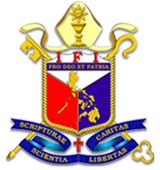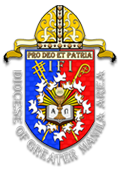THE HOLY NAME OF JESUS
(Reflection for New Year’s Day, January 1, 2022)
Luke 2: 15-21
(Reprinted, with permission, from “O, Come Emmanuel: Advent and Christmas Prayers and Reflections,” booklet published by the Iglesia Filipina Independiente and issued at the National Clergy Convocation in Davao City, November 19, 2018.)

By: The Rev. Victoria S. Esguerra
Retired Priest, Diocese of Greater Manila Area
NUMBERS 6: 22-27 – GOD TO AARON: PRIESTLY BENEDICTION
The title of the Book of Numbers, fourth book in the Torah (Moses’ Five Books), meant “numbering” (census enlisting all men over 20 years of age for military service). It covered the period of 38 years of the Israeli wandering in the Sinai Peninsula, starting two years after the escape from Egypt and ending upon the eve of entry into Canaan. In this Exodus, the “grumblings of a nation” reflected their hardships in the desert life; making the 350-kilometer/ 220-mile trip a lifetime journey. The story of a people complaining and full of discontent, nevertheless, God was constantly present and gave instructions to their leader, Moses. He, together with his brother, Aaron, served as the religious leaders and undertook the census, assisted by one representative from each tribe. Within them were the Nazirites (not Nazarites from Nazareth) who separated themselves from the Lord by their vows, distinct ascetic lifestyle, and were consecrated by the priests.
Here God spoke to Moses to tell Aaron and to bless the Israelites: “The Lord bless you and keep you; the Lord make His face to shine upon you, and be gracious to you; the Lord lift up His countenance upon you, and give you peace.” Thus the Lord’s Name should be on the Israelites (accepting God), and God would then bless them. In Judaism, the priest was no Mediator, and therefore could not bless the children of Israel. Only God could give effect to the blessing pronounced by the priest.
PSALM 8 – DAVID’S PRAYER TO DIVINE MAJESTY
The psalmist expressed his awe on the grandeur of God’s creation and his gratitude for making man (humans) in overall control/dominion of the Lord’s natural creation (animals, birds, fish, etc.). He was amazed why the Lord made humans just a bit lower than God Himself (even higher than the angels) and felt exalted and wondered why the Supreme Creator even cared for humans (His creation) like him. David, the psalmist, prayed exulting the Sovereign Lord: “How majestic is Your Name in all the earth.”
PHILIPPIANS 2: 5-11 – PRAYER TO JESUS’ HOLY NAME
Paul exhorts the Philippian church, first church he established in Europe in 50 AD, to help one another in humility, imitating the example of Jesus Christ – in love, compassion, sympathy, without selfish ambition or conceit. He reminded them though Jesus was made in human form, He did not aim for equality with God, and He emptied Himself like a slave. Paul said that Jesus’ Name is highly exalted as it was given by God, and that in every mention of His sacred Name [Jesus], “… every knee should bend” and every tongue should confess that “Jesus Christ is Lord, to the glory of God the Father.”
LUKE 2: 15-21 – PRAYER OF RESPECT FOR JESUS
Jesus as true King descended from the royal line of King David (through Joseph), according to Matthew’s genealogy; while Jesus’ birth was traced through Mary, according to Luke’s account. Joseph’s dynasty, traced from Abraham (father of the Jewish nation), was tainted by disreputable women – Tamar (wronged by Judah, her father-in-law), Rahab (Jericho prostitute), Ruth (Moabite with “questionable” allegiance), and Batsheba (with whom David committed adultery). However, Mary came from a family of priests; lineage traced back to Adam (father of the human race), hence Jesus called, the “Son of Man”. The Scriptures described the coming of the Messiah from the Davidic line by virtue of Joseph’s adoption; therefore, Jesus was officially called the “Son of David”.
After eight (8) days from birth, Jesus was circumcised and named “Jesus,” or “Joshua” in Hebrew which means “God saves”. He is also called “Immanuel” (Isaiah) or “God is with us”. As a firstborn male in a Jewish family, He was designated as holy to the Lord; and so His family presented Him to the Temple and His parents made offerings according to the “Halakha” or Jewish law. (Jewish tradition originally consecrated the first-born son as priest in service to the Lord. But when these consecrated first-borns became unworthy, they were replaced by the Levites in the service at the Sanctuary.)
GIVING NAMES. Naming a child established his/her uniqueness in creation and provided a closer relationship with God. The personal name signified identity (familial), character, and existence from a geographical area. In the Jewish tradition, child-naming was accompanied by circumcision, a rite of purification or offering of the child to God. This covenant of circumcision was made between the child, the parents, and God; thus strengthening the bonds of relationship among them. The original circumcision covenant could be traced back to the Old Testament between God and Abraham (i.e., circumcision of himself and his family).
Jewish parents gave personal names to their children which had religious meanings in the context of the people’s relationship with God: Isaiah (“God is salvation”), Samuel (“God hears”), Daniel (“My judge is God”), Delilah (“God draws up”), John/Johannan (“God is favor”), Job (“Where is the [divine] Father?”), Joel (“Yahweh is God”), etc. Their names were considered sacred and carried with them the respect of the family and the community. Choosing a child’s name was important for three reasons: (1) Child’s uniqueness in the world – individual life borne from God (gift from God); (2) Child blessed by God’s presence – covenant established; (3) Child as sign of social acceptance -- especially for the formerly barren wives.
WHAT’S IN GOD’S NAME? God the Father, God the Holy Spirit, God the Son
Between the nation Israel and God (Yahweh), uttering the Name of God was forbidden. “Thou shall not take the Name of your Lord God in vain.” (Exodus 20:7) His Name was so sacred that it could not even be pronounced. Yahweh, tetragram, was in the third person form, meaning: “He causes to be” – referring to God’s action and presence in the historical world. The Jews devised their own way of identifying the Supreme God, AS: “I Am Who I Am” (Alpha and Omega – first and last letters of the Greek alphabet); El (“God of Israel”); El Shaddai (“God” to the priestly group); El Olam (“Everlasting God”); El Elyon (“God Most High”); Elohim (“God in the Old Testament”).
In the New Testament, the Holy Spirit, Third Person in the [Holy] Trinity, is known only as the Counselor, Paraclete (“called to the aid of”), Advocate, and Comforter. Known as the Spirit of the Living God, His actions are felt and manifested in creation and the actions of the people [in the Church].
Jesus, the Second Person in the [Holy] Triune God, who walked on earth with His disciples, had numerous Names given to Him by those whom He encountered and blessed: Immanuel (“God is with us”), Prince of Peace, Mighty God, Wonderful Counselor, Holy One, Lamb of God, Prince of Life, Lord God Almighty, Lion of the Tribe of Judah, Root of David, Word of Life, Author and Finisher of Our Faith, Advocate, The Way, The Truth and the Life, Dayspring, Lord of All, I Am, Son of God, Shepherd and Bishop of Souls, Messiah, Savior, Chief Cornerstone, King of Kings, Righteous Judge, Light of the World, Head of the Church, Morning Star, Son of Righteousness, Lord Jesus Christ, Chief Shepherd, Resurrection and Life, Horn of Salvation, and Governor.
WHAT’S IN OUR NAME?
- God’s Divinity – we are sealed in God’s Name in baptism; born again in the Spirit; sharing in His royal priesthood and heirs to His eternal Kingdom; citizens with the angels, saints and blessed ones in heaven.
- Mortal Humanity – our names carry our own vulnerability as humans: short-lived and forgotten after our earthly existence; from “dust” we have been formed, and to “dust” we shall return; a speck in the wind, a grain of sand, a drop of water in this humongous universe.
- Unique Identity – yet we are given our own unique identity, genetic component/DNA, and different personality; loved and made special by God (Psalm 8) worthy to be the steward of all His creation and to be called God’s children; lower than God but higher than the angels.
DO WE LOVE OUR NAME? DO WE LOVE OTHERS AND THEIR NAMES? SO, WHY IS THERE SO MUCH DEROGATORY NAME-CALLING? NAME-BULLYING? NAME-HATING? IS THE NAME OR THE NAMES OF THE LORD JESUS TRULY IN OUR HEARTS? DO WE SPEAK THE NAME OF GOD IN VAIN, OR DO WE BEND OUR KNEE AT THE NAME OF JESUS?


